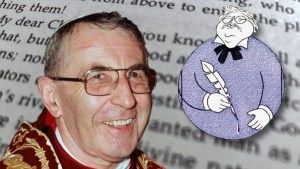To mark the 150th birthday of G.K. Chesterton, Aleteia is devoting much of today’s coverage to the man who looms so large (both figuratively and physically!) in the cultural life of Catholicism in the English-speaking world and beyond. Our celebration kicks off with a tribute from Joseph Pearce, who wrote a delightful biography of the “prince of paradox.”
One hundred and fifty years ago, on May 29, 1874, the great Catholic writer G.K. Chesterton was born. As a celebration of his life and legacy, let’s look at the story of his conversion to Catholicism and his influence on the Catholic Revival in the 20th century.
From the time of his publication of Orthodoxy in 1908, Chesterton was a tireless defender of the Catholic Church. In his novel The Man Who was Thursday, also published in 1908, the hero declares that “we are all Catholics now.” The hero of another of his novels, The Ball and the Cross, is a devout Catholic who argues the case for Catholicism unceasingly. It was not surprising, therefore, that most of his readers presumed that Chesterton was a Catholic. How could he not be, considering the Catholic perspective that pervaded all his work? And yet, surprisingly, Chesterton would not actually be received into the Church until 1922, 14 years after his declaration and defense of Catholic “orthodoxy.”
The delay was due to his not wanting to take such a momentous step until his wife, Francis, a happy and comfortably practicing Anglican, was willing to take the step with him. In the end, unable in conscience to delay any longer, he entered the Church without her. A few years later, Frances joined him.
A man who was key to the Catholic Revival
Both before and after his conversion, Chesterton’s writing was of pivotal and crucial importance to the Catholic Revival. That revival, which can be said to have begun with the conversion of St. John Henry Newman in 1845, was reinvigorated by Chesterton’s presence in the decades following Newman’s death. It would be no exaggeration to say that he presided over the Catholic cultural revival from the publication of Orthodoxy in 1908 until his death in 1936.
Among those whose own conversion or reinvigoration in faith was influenced by Chesterton: Graham Greene, Evelyn Waugh, J.R.R. Tolkien, C.S. Lewis, Dorothy L. Sayers, Ronald Knox, Fulton Sheen and Alec Guinness.
A great poet and “liberator”
Graham Greene viewed Chesterton’s poem “The Ballad of the White Horse” very highly, preferring it to other great poems, such as T.S. Eliot’s “The Waste Land.” Evelyn Waugh took a line from one of Chesterton’s Father Brown mysteries as the title of the final part of his novel Brideshead Revisited, in which Father Brown’s words serve as a metaphor for the theme of providence and grace in the novel.
J.R.R. Tolkien lauded what he called “Chestertonian fantasy” in his famous essay “On Fairy-Stories.” C.S. Lewis gave credit to Chesterton as a major influence on his own conversion from atheism to Anglican Christianity, declaring that Chesterton’s book The Everlasting Man had enabled him to see the Christian outline of history laid out before him for the first time.
“To the young people of my generation,” wrote Dorothy L. Sayers. “G.K.C. was a kind of Christian liberator.”
Paradoxes and a mystery-solving priest
Ronald Knox began reading Chesterton when he was “a schoolboy just beginning to think,” acknowledging that Chesterton’s famous quips and paradoxes soon became the “platitudes of my thought.” Knox described Chesterton as his “oracle,” adding that “he is so still.” Fulton Sheen acclaimed Chesterton as his favorite writer and as the writer who influenced him the most.
Then there is Sir Alec Guinness, who had a profound conversion experience when playing Father Brown, Chesterton’s popular priest detective, in a film adaptation. He was received into the Church soon after.
A “devoted son” who continues to inspire
Considering Chesterton’s influence on the faith journeys of so many of his contemporaries, it is not surprising that, following his death, Pope Pius XI should declare him to be a “devoted son” of the Church and a “gifted defender of the Catholic Faith.”
Today, 150 years after his birth and almost 90 years after his death, the works of G.K. Chesterton are still inspiring new generations of readers to find the Catholic faith or to follow it more faithfully. May we continue to celebrate the lingering and living legacy of his life and work.
Joseph Pearce is the author of ‘Wisdom and Innocence: A Life of G.K. Chesterton‘ (Ignatius Press).


